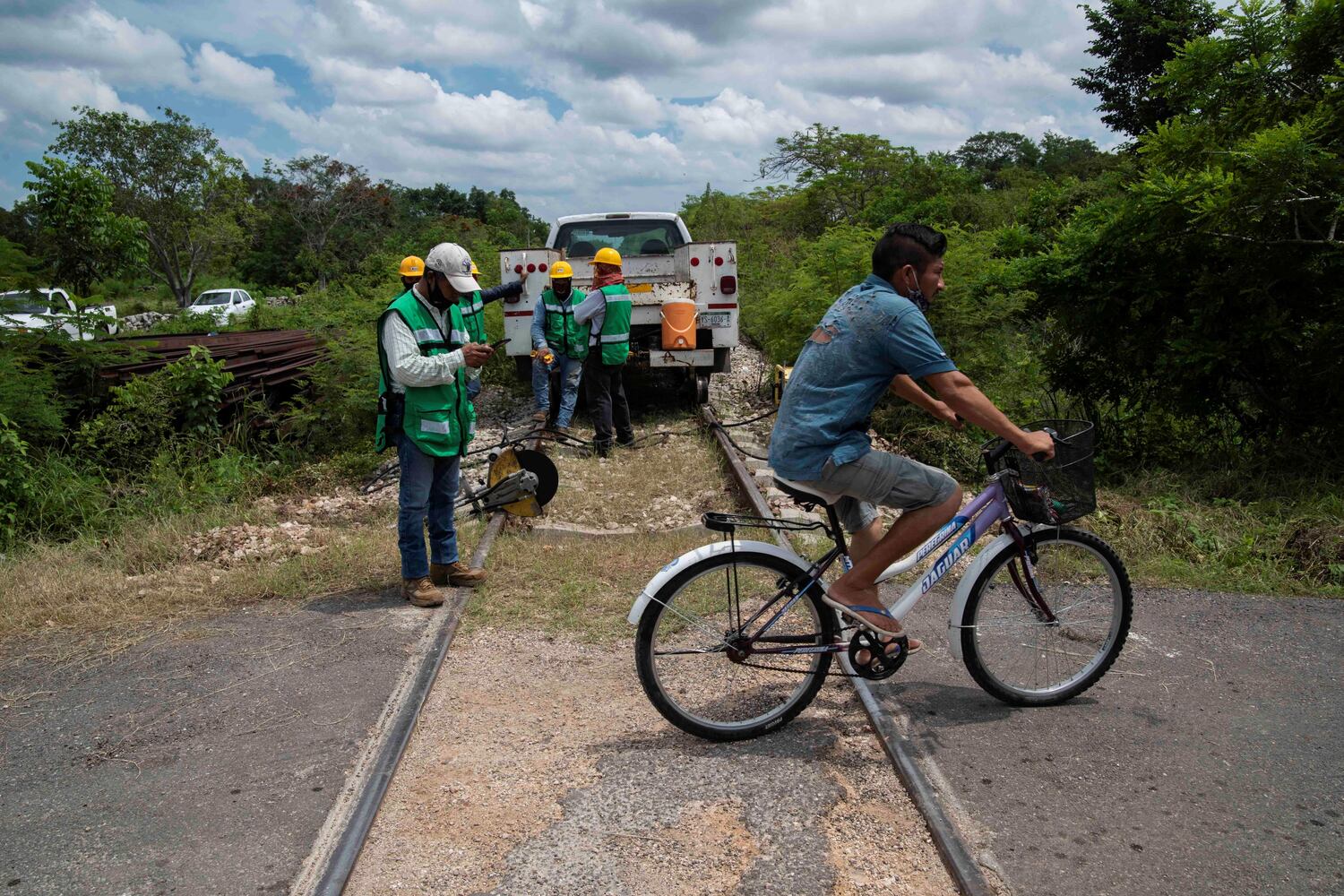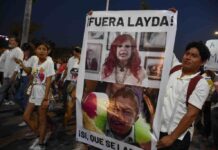Indigenous peoples and environmental organizations have started a legal battle to stop the construction of one of President López Obrador’s star projects.
Genomelín López has never voted. In his remote community nestled in the jungle of Calakmul, in the Mexican state of Campeche, few are interested in politicians who have rarely cared about them. A Chontal indigenous and guardian of the native seeds of his land, Genomelín, 40, has dedicated his life to growing yellow corn and popcorn, jalapeno peppers, black beans, or sesame.
That is why he is surprised that the president of his country, Andrés Manuel López Obrador, has affirmed that there are “political and electoral” interests behind the protection that he and a hundred indigenous people, inhabitants of the Yucatan peninsula and organizations in defense of the environment filed against one of the Government’s flagship mega works, the Mayan Train.
The legal offensive obtained an important victory last week after a Campeche court ordered the suspension of the works of the second section of the train while the trial is resolved. It is not the first time that the infrastructure plan has reached the courts: so far it has accumulated three suspensions derived from nine amparos filed by indigenous Mayans, Chuun T’aan and Chol.
The railroad will run 1,500 kilometers through the states of Chiapas, Tabasco, Campeche, Yucatán, and Quintana Roo, but the project is much more than a passenger train. It is estimated that 70% of the income comes from cargo transportation, largely from fuel (to serve the six gas pipelines in the southeast of the country) and products from the region’s thriving agribusiness, such as soy or pork.
Also, he contemplates the construction of “development poles” around the 19 train stations in which “urban planning will be promoted” and will include “services and infrastructure.” The opacity with which the plan has been maintained has not allowed us to know many details about this territorial reorganization, but it is what most worries the plaintiffs.

In the community of Ricardo Payro, where Genomelín López lives, he is concerned about where the water will come from to supply a development pole in a place where it is scarce. Their crops depend on the rainy season and for domestic use they collect it in cisterns for the dry months. “We are going to run out of water to please tourism,” he fears.
Access to this remote area of Mexico is difficult, which has kept mass tourism away although it is home to one of the most important archaeological sites in the country and the second-largest extension of tropical forest in America, after the Amazon. The jaguar is the most distinguished of the 86 types of mammals in the reserve, where more than 280 species of birds and 50 species of reptiles live.
“We do not want to become another Cancun, there they have already killed all the mangroves. Here we still have high jungle, ”says Geno, as his colleagues from the Xpujil Indigenous and Popular Regional Council know him. Fifteen members of the organization have joined the legal battle.

The amparo argues that the megaproject violates the right to a healthy environment, established in Article 4 of the Constitution. The president started the works last June even though the Ministry of the Environment and Natural Resources (Semarnat) had not yet authorized the Environmental Impact Manifestation (MIA), something that did not happen until early December.
The MIA was not only presented after the start of construction but also divided the project into different phases instead of considering the possible effects of the entire work. This violates the General Law of Ecological Balance, says Xavier Martínez, operational director of the Mexican Center for Environmental Law (Cemda), one of the organizations that filed the complaint.
The lawyer warns that the Mayan Train “will fragment the ecosystems of the Yucatan Peninsula.” In addition to Calakmul, the railway line will cross eight important natural areas, such as the Los Petenes reserve, in Campeche, or the Sian Ka’an reserve, in Quintana Roo. “The project is repeating a development scheme that has great impacts on sustainability and it seems that we have not learned the lesson,” says Martínez.
The environmental impact statement plans to deforest 800 hectares of forest (equivalent to 1,120 soccer fields) in the first of the two construction phases. The document argues that it will compensate the logging with a program of reforestation and relocation of species.
“These megaprojects say: ‘there are 50 ceibas that cost 1,000 pesos, but I am going to invest a million pesos, so it is justified that I cut them. But we do not see the economic value, for us, the ceiba is a tree that symbolizes the three planes of the universe ”. Pedro Uc, an indigenous Mayan from the town of Buctzotz, in Yucatán.
“We are neither consulted, nor asked, nor taken into account when deciding to build this project that responds to interests outside those of the indigenous communities,” he says at an accelerated pace, calling the public consultation a “farce” promoted the López Obrador government in December 2019, criticized even by the United Nations.
Pedro Uc, during a conference with Mayan communities.

In 2018, Pedro Uc joined with representatives from 25 communities in Yucatán to form the Assembly of Defenders of the Maya Múuch ’Xíinbal Territory and fight against megaprojects, pig farms, and transgenic soy that he says threaten his territory. Critical of López Obrador, he condemns that he “is working with the same corrupt companies as previous governments.”
A recent report by the Power organization revealed that 90% of the Mayan Train tenders have been awarded directly. One of the juiciest contracts, that of section four, was assigned without a public tender for 25.8 billion pesos to the Mexican construction company ICA. That was one of the firms that participated in the construction of the Mexico City airport, which was finally canceled in 2018 by the president under accusations of corruption.
Besides, the contract for section two of the work – which has been suspended this week by order of the judge – was won by a consortium formed by a subsidiary of Grupo Carso, the magnate Carlos Slim and a large investor in the canceled airfield, and the Spanish FCC, charged in Panama for a corruption case related to Odebrecht, the largest bribery scheme in Latin America.
Pedro Uc and his colleagues in the Assembly have promoted three other appeals against the Mayan Train, advised by the organization in defense of human rights Indignación. All were rejected by the judge, but a higher court decided to turn one of them over to the Supreme Court to decide whether they should be admitted or not.
The activist knows that the fight will be complicated “because there are too many economic interests involved.” He has experienced firsthand what it means in Mexico to fight these interests: at the end of 2019, he and his son received a death threat that gave them 48 hours to leave their community. But they are still there. “Even if we know we have no hope of winning, we will always fight.”
Source: elpais.com





